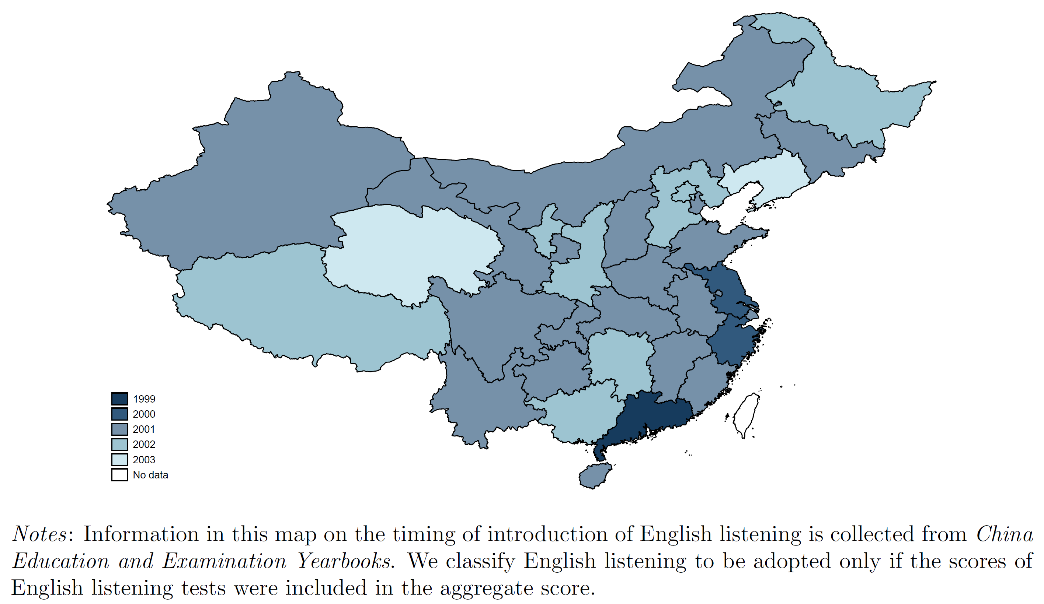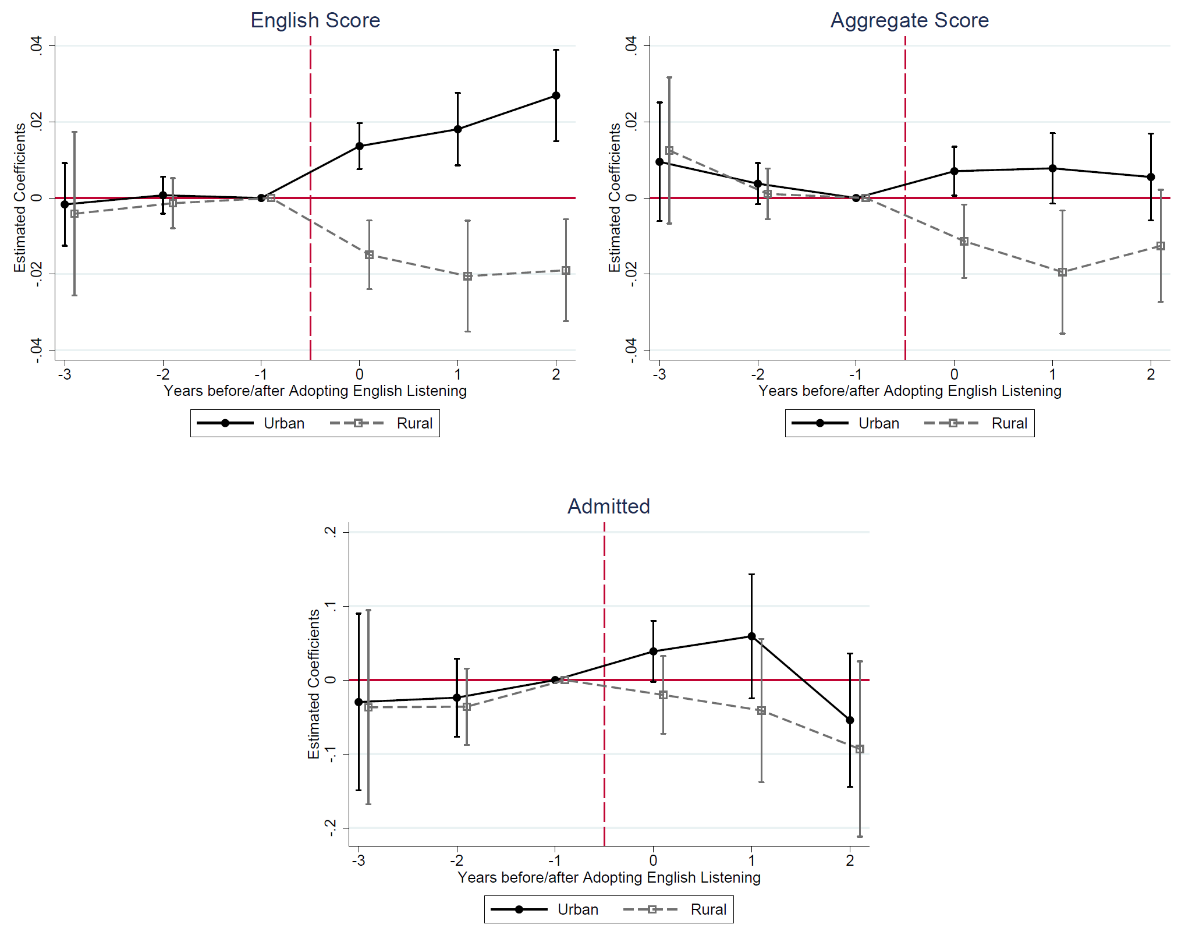English Language Requirements and Educational Inequality in China
In 1999, China decided to gradually introduce mandatory English listening tests in its high-stakes National College Entrance Examination (NCEE) over the subsequent five years. Using data from all the 16 million NCEE test-takers during that period, we reveal an important unintended consequence of this policy: it systematically enlarged China’s rural-urban gap in access to higher education, with potentially far-reaching consequences for income inequality.

Economic globalization in recent decades has been accompanied by a “globalization of English education,” as many non-English-speaking countries established English curriculum and relevant assessment and selection criteria in their education systems. Today, there are more than 1.5 billion English learners across the globe, accounting for more than 20% of the world population, and four times the total number of native English speakers worldwide. Solid English skills can lead to better job opportunities (Azam, Chin, and Prakash 2013; Bleakley and Chin 2004; Berman, Lang, and Siniver 2003).
However, learning English, especially listening and speaking, often relies on resources that students from disadvantaged backgrounds may lack, such as private tutors, access to English media like movies and magazines, or even foreign teachers who are native English speakers. As a result, requiring English language skills in educational assessment and selection may hurt students from disadvantaged backgrounds relative to their peers, and thus reduce their socioeconomic mobility in the long run.
While the relationship between English language requirements and educational inequality is frequently mentioned in policy discussions worldwide, little rigorous evaluation of this conjecture exists. Our recent study (Li et al. 2024) fills this gap by analyzing the impacts of the staggered introduction of English listening exams in China’s high-stakes National College Entrance Examination (NCEE) between 1999 and 2003, using data from more than 16 million NCEE test-takers from that period.
In China, millions of high school graduates take the NCEE, a high-stakes, closed-book exam that determines which college a student can attend, every year. Colleges use students’ NCEE scores, along with their reported college preferences, to make admissions decisions. Due to fierce competition, even a small improvement in a student’s NCEE score can potentially lead to significant improvements in their access to higher education.
In 1978, the NCEE started testing English, but only in reading and writing. By 1999, China's growing involvement in the global economy led the Ministry of Education to require all provinces to include English listening tests in the NCEE by 2003. This meant that between 1999 and 2003, different provinces gradually added a listening test worth 30 points (20% of the English exam and 4% of the entire NCEE) to the NCEE. Figure 1 illustrates the staggered rollout schedule.
Figure 1: Timing of English Listening Adoption by Province

This staggered introduction allows us to causally estimate the impacts of the English listening tests on the rural-urban gap of NCEE performance and college admission outcomes. Using proper econometric methods, we find that introducing English listening tests into the NCEE significantly lowered rural students’ English score percentile ranks by more than two percentage points or a more than 60% increase of the baseline rural–urban gap in NCEE English exam performance. In contrast, we find that introducing English listening tests had no effect on urban-rural gaps in Chinese or math scores. In terms of overall NCEE performance, we estimate that introducing NCEE English listening tests enlarged the rural-urban gap by a magnitude of more than one percentage point.
The effects on NCEE scores further translate into a widened rural-urban gap in college admissions, leading to a two-percentage-point drop in rural students’ chance of admission relative to their urban peers. This represents a significant widening of the existing rural-urban gap of roughly 30%. Figure 2 shows the dynamic effects of these baseline results.
Figure 2: Event Study on Urban and Rural Students’ NCEE Scores and Admission

We further investigate the influence of English listening test scores on admission outcomes across different tiers of colleges, noting the particularly high returns of attending elite institutions in China, as highlighted by Jia and Li (2021). Our analysis reveals varied impacts on admissions to more selective colleges. Figure 3 shows that English listening tests’ effects on college admissions varies by academic ability, proxied with their Chinese plus math score percentile rank. For below-median students, English listening tests mainly affected rural-urban gaps in admissions to any college. On the other hand, for students in the top quartile, the policy mostly impacted admission gaps to the most elite colleges, namely “Project 211/985” colleges.
Figure 3: Heterogeneity of Treatment Effects Stratified with Student Performance

Our findings suggest that between 1999 and 2003, due to the introduction of English listening tests in the NCEE, more than 54,000 rural students lost their college seats to their urban peers, with an additional 11,000 rural students losing elite college seats. Considering the significant returns associated with college education in China, particularly from elite institutions, the displacement of rural students by their urban counterparts in college admissions could effectively result in a future income shift from rural to urban students. Combining findings of Li, Liu, and Zhang (2012) and Jia and Li (2021) with our own, we perform simple back-of-the-envelope calculations, which indicate that between 1999 and 2003, rural students lost over 450 million RMB in potential future annual income to urban students due to the incorporation of English listening tests in the NCEE. It is important to note that this estimate is on the conservative side, as it accounts only for admitted versus non-admitted students and elite versus non-elite admission, while the policy adversely affects the relative academic performance of rural students across the board, many of whom end up in less prestigious colleges or in less sought-after majors. Accounting for these effects would lead to even larger estimates of future income loss for rural students.
Conclusion
Our work provides the first rigorous empirical evidence of how English language requirements in education affect educational inequality in a non-English-speaking country. Our findings suggest the need for nuance in modifying high-stakes exams that have significant implications for students’ educational paths and career prospects. The addition of new exam components, while aimed at encouraging the development of valuable skills, may inadvertently widen the gap between urban and rural students if implemented too rapidly. A slower approach, gradually integrating new material with rising weight over time, could mitigate this risk. Furthermore, government support for rural education, through increased resources like improved teachers and learning materials, could empower more rural students to acquire these valuable English skills, ultimately benefiting them in the job market.
References
Azam, Mehtabul, Aimee Chin, and Nishith Prakash. 2013. “The Returns to English-Language Skills in India.” Economic Development and Cultural Change 61 (2): 335–67. https://doi.org/10.1086/668277.
Berman, Eli, Kevin Lang, and Erez Siniver. 2003. “Language-Skill Complementarity: Returns to Immigrant Language Acquisition.” Labour Economics 10 (3): 265–290. https://doi.org/10.1016/S0927-5371(03)00015-0.
Bleakley, Hoyt, and Aimee Chin. 2004. “Language Skills and Earnings: Evidence from Childhood Immigrants.” Review of Economics and Statistics 86 (2): 481–96. https://www.jstor.org/stable/3211642.
Jia, Ruixue, and Hongbin Li. 2021. “Just above the Exam Cutoff Score: Elite College Admission and Wages in China.” Journal of Public Economics 196, 104371. https://doi.org/10.1016/j.jpubeco.2021.104371.
Li, Hongbin, Pak Wai Liu, and Junsen Zhang. 2012. “Estimating Returns to Education Using Twins in Urban China.” Journal of Development Economics 97 (2): 494–504. https://doi.org/10.1016/j.jdeveco.2011.05.009.
Li, Hongbin, Lingsheng Meng, Kai Mu, and Shaoda Wang. 2024. “English Language Requirement and Educational Inequality: Evidence from 16 Million College Applicants in China.” Journal of Development Economics, 103271. https://doi.org/10.1016/j.jdeveco.2024.103271.

Latest
Most Popular
- VoxChina Covid-19 Forum (Second Edition): China’s Post-Lockdown Economic Recovery VoxChina, Apr 18, 2020
- China’s Great Housing Boom Kaiji Chen, Yi Wen, Oct 11, 2017
- China’s Joint Venture Policy and the International Transfer of Technology Kun Jiang, Wolfgang Keller, Larry D. Qiu, William Ridley, Feb 06, 2019
- The Dark Side of the Chinese Fiscal Stimulus: Evidence from Local Government Debt Yi Huang, Marco Pagano, Ugo Panizza, Jun 28, 2017
- Wealth Redistribution in the Chinese Stock Market: the Role of Bubbles and Crashes Li An, Jiangze Bian, Dong Lou, Donghui Shi, Jul 01, 2020
- What Is Special about China’s Housing Boom? Edward L. Glaeser, Wei Huang, Yueran Ma, Andrei Shleifer, Jun 20, 2017
- Evaluating Risk across Chinese Housing Markets Yongheng Deng, Joseph Gyourko, Jing Wu, Aug 02, 2017
- Privatization and Productivity in China Yuyu Chen, Mitsuru Igami, Masayuki Sawada, Mo Xiao, Jan 31, 2018
- How did China Move Up the Global Value Chains? Hiau Looi Kee, Heiwai Tang, Aug 30, 2017
- China’s Shadow Banking Sector: Wealth Management Products and Issuing Banks Viral V. Acharya, Jun Qian, Zhishu Yang, Aug 09, 2017




 Facebook
Facebook  Twitter
Twitter  Instagram
Instagram WeChat
WeChat  Email
Email 


